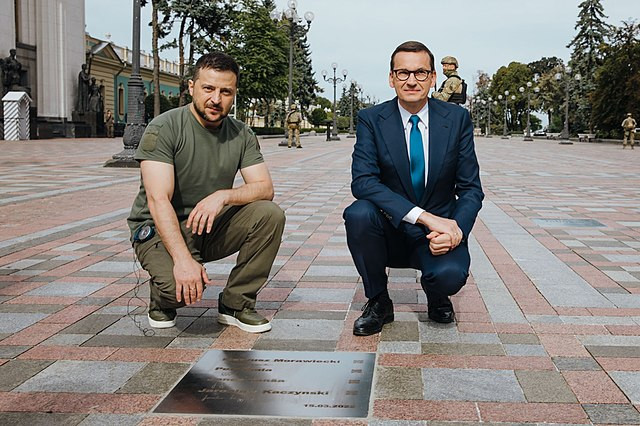The Polish Armed Forces Operational Command announced on Sunday that it had activated its air force after a Russian cruise missile violated the country's airspace during a massive attack on western Ukraine and the capital city of Kyiv. The incident has further escalated tensions between Russia and Ukraine, as the two countries engage in a series of deadly aerial attacks and a new flashpoint emerges over the militant attack on a Moscow concert hall that killed at least 137 people.
According to the Polish military, the cruise missile entered Polish airspace near the town of Oserdów in the early hours of Sunday and remained there for 39 seconds. The missile was observed by military radar systems throughout its entire flight, prompting the activation of Polish and allied aircraft. The increased military activity may result in higher noise levels, particularly in the southeastern part of the country.
Polish army spokesperson Jacek Goryszewski stated that the missile traveled approximately 2 kilometers (1.2 miles) into Polish airspace before returning to Ukraine. Poland has announced its intention to demand an explanation from Moscow regarding the airspace violation, with the country's foreign ministry calling on Russia to "stop the terrorist air attacks on the inhabitants and territory of Ukraine, end the war, and address the country's internal problems."
The incident occurred as Russia launched its third pre-dawn attack on Ukraine in the past four days, targeting the capital of Kyiv and the western region of Lviv. Ukrainian officials described the strikes as "massive," with Kyiv's mayor, Vitali Klitschko, urging residents to remain in shelters as the city's air defenses worked to intercept the incoming missiles.
Serhiy Popko, head of the Kyiv city military administration, reported that the missiles were fired at the capital "in groups," but preliminary reports suggested no casualties or damage, with the city's air defenses successfully hitting "about a dozen" missiles. In Lviv, mayor Andriy Sadovy said approximately 20 missiles and seven Iranian-made Shahed drones targeted critical infrastructure facilities in the region.
The escalation in aerial attacks comes amid heightened tensions between Russia and Ukraine following the militant attack on a Moscow concert hall on Friday. Ukrainian President Volodymyr Zelenskiy accused Russian President Vladimir Putin of seeking to "shift the blame" onto Kyiv for the attack, despite Ukraine's denial of involvement and the Islamic State claiming responsibility.
"What happened yesterday in Moscow is obvious: Putin and the other thugs are just trying to blame it on someone else," Zelenskiy said in response to Putin's assertion that the suspects had been fleeing towards Ukraine. "They have brought hundreds of thousands of their own terrorists here, on Ukrainian land, to fight against us, and they don't care about what is happening inside their own country."
As the Russia-Ukraine conflict continues to escalate, both sides have increased their air attacks in recent weeks. The Ukrainian military claimed on Sunday to have hit two large Russian landing ships and other infrastructure used by the Russian navy in the Black Sea during overnight strikes on the annexed Crimean peninsula. Meanwhile, multiple air attacks on Saturday on the Russian border region of Belgorod adjoining Ukraine killed two people and injured at least seven, according to the regional governor.
The escalating violence has prompted Ukrainian President Volodymyr Zelenskyy to urge Western allies to provide additional air defense systems and ammunition, as a $60 billion aid package from the United States remains stalled in Congress. As the international community watches the situation unfold, the breach of Poland's airspace by a Russian missile has added another layer of complexity to the ongoing conflict, underscoring the potential for regional spillover and the need for diplomatic efforts to de-escalate the situation.
Reuters and Business Insider contributed to this report.






